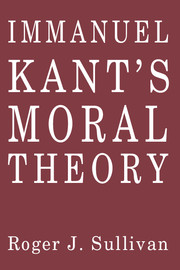Book contents
- Frontmatter
- Contents
- Preface
- Key to abbreviations and translators
- 1 Introduction
- 2 The context for Kant's moral philosophy
- Part I The nature of morality
- Part II The moral norm for persons
- Part III The norm for moral judgment
- 11 The Categorical Imperative
- 12 The Formula of Autonomy or of Universal Law: Part I
- 13 The Formula of Autonomy or of Universal Law: Part II
- 14 The Formula of Respect for the Dignity of Persons
- 15 The Formula of Legislation for a Moral Community
- Part IV Kant on history, politics, and religion
- Appendixes
- Notes
- Bibliography
- Index of names
- Index of subjects
12 - The Formula of Autonomy or of Universal Law: Part I
Published online by Cambridge University Press: 05 June 2012
- Frontmatter
- Contents
- Preface
- Key to abbreviations and translators
- 1 Introduction
- 2 The context for Kant's moral philosophy
- Part I The nature of morality
- Part II The moral norm for persons
- Part III The norm for moral judgment
- 11 The Categorical Imperative
- 12 The Formula of Autonomy or of Universal Law: Part I
- 13 The Formula of Autonomy or of Universal Law: Part II
- 14 The Formula of Respect for the Dignity of Persons
- 15 The Formula of Legislation for a Moral Community
- Part IV Kant on history, politics, and religion
- Appendixes
- Notes
- Bibliography
- Index of names
- Index of subjects
Summary
Stated as an imperative, the Law of Autonomy commands us to “act only on that maxim through which you can at the same time will that it should become a universal law” (Gr. 52/421). This is also the first formula of the Categorical Imperative, the Formula of Autonomy or of Universal Law, which exhibits its origin in the logical principle of noncontradiction by obligating us to adopt and act only on maxims that are consistent with themselves when considered also as laws for everyone. Only such maxims are formally fit to serve as maxims for autonomous agents.
Kant calls this formula the “supreme principle of right” because it obligates us to recognize and respect the right and obligation of every other person to choose and to act autonomously (M.M. 231). Since moral rules have the characteristic of universality, what is morally forbidden to one is forbidden to all, what is morally permissible for one is equally permissible for all, and what is morally obligatory for one is equally obligatory for all. We may not claim to be exempt from obligations to which we hold others, nor may we claim permissions we are unwilling to extend to everyone else.
Kant offers some twenty variations of the first formula. Some stress that we act autonomously only when we act on maxims fit to be universal laws: “I ought never to act except in such a way that I can also will that my maxim should become a universal law” (Gr. 17/402).
- Type
- Chapter
- Information
- Immanuel Kant's Moral Theory , pp. 165 - 179Publisher: Cambridge University PressPrint publication year: 1989



